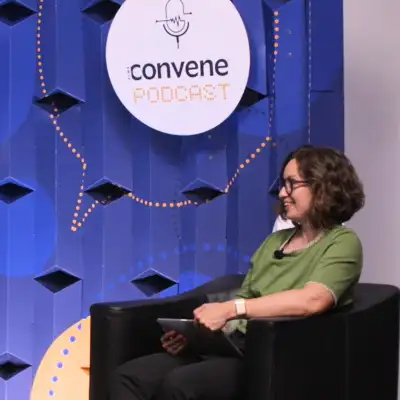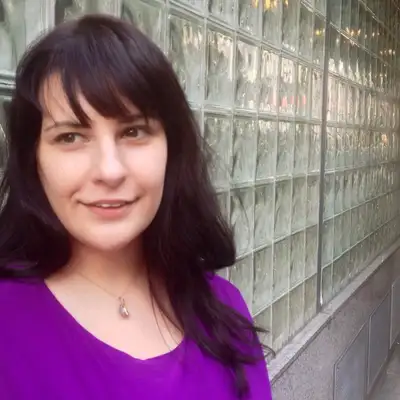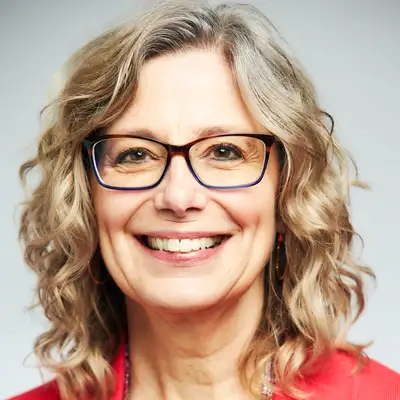Creators and Guests
What is PCMA Convene Podcast?
Since 1986, Convene has been delivering award-winning content that helps event professionals plan and execute innovative and successful events. Join the Convene editors as we dive into the latest topics of interest to — and some flying under the radar of — the business events community.
Convene Talk, ep. 73/Aug 08, 2025
*Note: the transcript is AI generated, excuse typos and inaccuracies
Magdalina Atanassova: This is the Convene Podcast. Welcome to another episode of the Convene Talk. Michelle, what have you picked for today?
Michelle Russell: So I picked a story that was not in News Junkie, but I think we've all seen it. It was reported pretty widely. It is the pandemic aged our brains, whether we got Covid or not.
And it was a study that was done in the UK using brain scans from a very large database.
And British researchers determined that during the pandemic years of 2021 and 2022,
people's brains showed signs of aging, including shrinkage. And the report was published in Nature Communications.
So whether or not people had the virus,
this was the finding when they did these brain scans.
So people who did get infected with the virus also showed deficits in certain cognitive abilities such as processing speed and mental flexibility.
And they think that generally, they think the reason why was the social isolation and dealing with the uncertainties and the anxiety surrounding Covid. And,
you know, I don't think a lot of us want to go back and remember those days, but especially in the beginning, it was very, it was a very anxious time for all of us, wondering how long it was going to last,
how we were going to be affected. I think in our industry it was particularly alarming that it went on for so long and that events could not meet in person.
So a lot of us were very concerned about our livelihoods. We saw a lot of people lose their jobs.
You know, destinations were hugely affected.
So it's like, it doesn't sound like it's a lot. They found a five and a half month acceleration in aging associated with the pandemic.
Five and a half months doesn't sound like a lot, but if you're finding something, generally it seems like it was an effect that really took a toll on all of us, and I think we talked about this a while ago, is that it would take a while for us to understand all of the after effects of the pandemic.
And how does this relate to our industry? Well, I just said, obviously all of us were impacted by Covid as an industry, but also it just reinforces the need for social connection and how events bring people together and how that has a very real impact not just on our mental state,
but on our physical brains.
And I think this was reinforced for me just recently when I did a story and I interviewed the meeting planner for the American College of Lifestyle Medicine,
ACLM.
And they have these pillars. Lifestyle medicine is built around proven scientific studies of the behaviors that contribute to health.
So it has to do with diet, exercise.
And one of the pillars is social connection.
So they build that into how when you're speaking with patients, they will ask them, what are your social connections? Like who do you live with,
who is in your immediate community? Because this is a very important part of mental and physical health. And they make sure that this is a big component of their event.
They sort of force it at their event by making sure everyone is under the same venue. So they bring more than 2,000 people to one venue. They look for kind of resorts where there's indoor and outdoor space and where people are going to bump into each other in the elevator or when they go to breakfast.
They're going to see that almost everybody there is at the conference. And so there are just a lot more opportunities for social connection.
That's how I kind of related it to our industry.
I'm wondering what everybody else on this call thought. Maggie, I'll go with you first.
Magdalina Atanassova: Yeah, thanks.
I really like the story as well and the fact that as you mentioned in, in the email that you sent to us, that brain health is shaped not only by illness but by our environment.
And that made me think of,
you know, in the sense of our industry,
how is our environment really affecting our mental state? And I went to our resources to see what we've actually written about and there's quite a lot of mention. We have covered mental health very extensively also around the times of COVID I like there was a story around that time about favorite pastimes during the pandemic hobbies that the team shared.
And it kind of relates to the fact, to another story that I found that was published last year. If I'm not mistaken,
Barbara was quoting sight.
It's called an events Industry Leaders strategies for managing Stress.
And what I really loved is that it's really up to the individual.
That was kind of the big takeaway for me that for you to stay healthy, it's really up to you to take care of yourself, to be aware of what triggers you and to speak about those things.
So having hobbies was one time to deal with stress during the pandemic, but also having those open relationships in workplace so that you can address actually those issues, I think is very important.
And I'm wondering how many people in that survey in the UK in that research that they did really struggle with that openness. And like you said, Michelle, having this social connection, having the way to kind of vent in a sense and say, you know, this is causing me a lot of stress.
I need help, I need you know, I need to do something about it. So if you as an individual cannot figure it out, maybe, you know,
a professional or friend, somebody could help out. So I'm wondering if that's if there is an effect there and one of the other things that just relates to the environment.
MICHELLE Last year you wrote about the wildfires and how they affect us.
And there is also linkage to dementia,
which was very interesting study that apparently because of the air pollution that is caused from wildfires,
scientists now are finding this link that can cause dementia, which I believe is also it's affecting events. But also we ourselves have been a couple of years ago at Educon in Montreal, where there were nearby wildfires and we could all smell the smoke in the city and it was scary in a way.
And also now I'm conscious that it was causing us other damage that, you know, we can't feel it in the moment.
But yeah, I guess we were affected also physically.
So, yeah, that I went and grabbed many different things, put them together.
That's how my brain works sometimes.
Kate Mulcrone: KATE so something I find interesting about the article is they make a distinction between people who had Covid and showed lower cognitive function afterwards,
and people who didn't have Covid but still showed the brain aging due to the uncertainty of the era.
And so I think it's fair to say the isolation and uncertainty caused this regardless.
But that meetings and events are one of the few sort of touch points that you could point to as a way for people to, as they say on the Internet, touch grass or physically gather and co regulate with people who understand your struggle.
Maybe you're a member of an association and all the people you work with don't really have the same job as you.
But then you finally go to the annual meeting you love to go to and there are your people and they understand your struggle and it helps you neurologically, I would guess, in a way that can't really be quantified.
And that's why people on the Internet just call it go touch some grass,
when in reality it's go to a real place with real people and regulate your nervous system by talking to them. Michelle?
Michelle Russell: I love that one of the things we did during COVID was we did these pulse checks. And the first question I thought was important that we ask is, how are you feeling?
Like, how?
Because I think it was important for us to get a sense of our people feeling hopeless. Like, this is never gonna,
Are they feeling, are they showing resilience? Are they. And it would kind of fluctuate from month to month.
But I was reading something in Fast Company yesterday which I hadn't seen before,
but it was a tweet from Elmo.
I think everyone knows Elmo from Sesame Street.
And so there is this social account for Sesame street and Christina Vidis, who I guess is somehow she, she's in charge of the social media accounts for Sesame Street.
She posted a nine word tweet. Elmo is just checking in. How's everybody doing? That was January 29, 2024.
And it sort of just like became a viral tweet. And people started responding and they were amazed by how many people like just wanted to talk about their feelings and what they were.
And of course, you know, Elmo is just this very neutral tool or character that I think we've all come to love. If you've watched Sesame street at all.
And Elmo learned that it's very important to check on your friends and see how they're doing because maybe they're not okay. And sometimes just being a friend can help. And I thought that was just a very sweet kind of conversation that was started online.
But I do love touch some grass. Cause I,
I love to go outside now and I do touch the grass. I sometimes just take my shoes off and put my feet in the grass to kind of ground me.
Especially when you're sitting at your desk all day looking at the screen.
Jen Dienst: Yeah. There are studies that actually say that, like digging around in the dirt and like gardening is like super good for your.
Your brain health,
which I think is,
I mean, basically the same thing. Right. Like, you gotta work with the tangible to like feel human, you know?
And I mean, I feel like gatherings are the best ways to do that. I mean, this isn't quite our industry, but I think it kind of demonstrates the same thing, which is how right now in tourism,
people are traveling more for live experiences.
Like, I, I'm. This is top of mind for me because I just got back from seeing two, not one, but two concerts in Las Vegas.
Backstreet Boys at the Sphere, if anyone's curious. And Kelly Clarkson.
So it was a millennial extravaganza.
But I think that's such a good example of people are traveling for an experience.
And not only to experience like the act or whatever it is, but to do it in a way that's shared with other people who are just as passionate and excited about they are.
I think I saw something about how Puerto Rico has seen a huge bump in tourism due to,
I think, Bad Bunny,
his concerts. And of course, you know, We've written at length about the effect that Taylor Swift has had on tourism and,
you know, hotel rates and even events being able to losing out on parts of their room blocks. So I think, yeah, I think if we look to that, if we look to how popular the live experiences are when it comes to why people are actually getting up and traveling,
I mean, that's a huge part of it. It's a shared experiences with other humans that feels, you know,
you can't replicate that online.
It's an alternative, sure, but it's not the same.
Magdalina Atanassova: Now with work being largely remote, a lot of companies are doing the hybrid version, but a lot of people are moving to fully virtual or fully remote. And that is causing some issues which we, you know,
we have to address.
Some of us are very well adjusted to that lifestyle,
but it's not for everybody for sure,
and definitely also affects mental health. And speaking of, back in the COVID era, a lot of people also lost their job, so that's an extra stress. But for those that stayed,
that for sure,
you know, brought some tensions.
And SHRM has a research,
I think that their latest One is from 2023 that shows generational mental health divide, which was very interesting,
and how the different generations are responding to mental health challenges in the workplace.
And some data points that I found that they quoted. So they said that more than one in four Generation Z workers say their job made them feel depressed at least once a week in the last six months.
And again, that's 2023 compared to 18% of millennials and 14% of Gen Xers and 7% of baby boomers.
And 42% and 36% of Generation Z workers and millennial workers, respectively,
say their job made them feel overwhelmed once a week in the last six months,
compared to less than 1 in 4 of baby boomers.
So, you know, there's those. Younger generations are,
I guess, more sensitive to how the job affects them.
And it could be because we're more digitally native, we've grown up with technology,
but we also respond to it differently. I don't know. I don't know. There is something there. I'm not sure how to verbalize it and how to put it in a coherent way, but it's interesting to see that.
Michelle Russell: I do think it's generational. Just speaking as a baby boomer, we didn't talk about mental health in the workplace at all.
It was just like,
you work really, really hard.
That is a badge of honor. The more you work, the harder you work,
the more hours you put in the more things you sacrifice in your personal life,
that's a badge of honor. And, like, if you're feeling down or overwhelmed, you just suck it up and you start over the next day. That is just the way we were all raised was just part of our upbringing.
And I'm not saying it's a good. A good thing certainly is not a good thing.
And I think this also happened to people, even in my generation after Covid, where you just reevaluated things and you saw,
like, this lifestyle that I had before COVID where I was on the road all the time, and I was just pushing myself so hard.
That's really no way to live.
And I've just, you know,
speaking for myself and for other people, reevaluated what their priorities were in their life.
So I think.
I think there are probably more baby boomers who now say, oh, this is, like,
this is a little overwhelming, or this is not where I want to invest so much of my time anymore.
And I think that's a good thing. But it is definitely having an effect on the workplace, and it's just a changing dynamic.
Magdalina Atanassova: Yeah. Thank you all for the great discussion.
Michelle Russell: Thanks, Maggie.
Magdalina Atanassova: Remember to subscribe to the Convene Podcast on your favorite listening platform to stay updated with our latest episodes. For further industry insights from the Convene team, head over to PCMA.org/convene. My name is Maggie. Stay inspired. Keep inspiring. And until next time.



